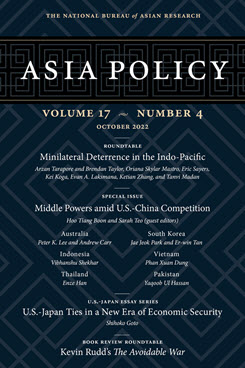Essay in Asia Policy 17.4
Indonesia’s Great-Power Management in the Indo-Pacific
The Balancing Behavior of a “Dove State”
This essay investigates Indonesia’s strategic thinking toward the Indo-Pacific region amid changing great-power politics and examines both the principal drivers shaping Indonesia’s strategic choices and the challenges facing Indonesian diplomacy in the region.
EXECUTIVE SUMMARY
MAIN ARGUMENT
The Indo-Pacific region, born out of the great powers’ efforts to forge new strategic alignments and reset the balance of power in Asia, is headed for a multi-tiered polarization that provides a challenging geostrategic context for Indonesia in the coming years. The U.S. and China form the two poles shaping the global and regional balance of power. Indonesia no longer holds a positive view toward the U.S.-China relationship in the Indo-Pacific region, and this gloomy view has prompted Jakarta to craft a foreign policy that mirrors what some experts refer to as “dove state” behavior. As a dove state, Indonesia has sought to balance its interests while navigating the uncertainties of the great-power rivalry. However, the strength of Indonesian diplomacy is likely to depend on the country’s ability to walk a middle path as well as its ability to both keep ASEAN together and position the grouping as a credible regional architecture.
POLICY IMPLICATIONS
- Indonesia is a status-quo power and is likely to oppose any policy initiative that amplifies the risk of great-power conflict or instability in the region.
- As a developing country, a populist democracy, and an emerging market, Indonesia will respond proactively and positively to overtures that advance the country’s economic development.
- Great-power bellicosity and a weakened ASEAN may push Indonesia to be more insular and concentrate on partnerships that support Jakarta’s development agenda.
Vibhanshu Shekhar is an Adjunct Professorial Lecturer at American University in Washington, D.C. (United States) and author of Indonesia’s Foreign Policy and Grand Strategy in the 21st Century: Rise of an Indo-Pacific Power (2018).
About Asia Policy
Asia Policy is a peer-reviewed scholarly journal presenting policy-relevant academic research on the Asia-Pacific that draws clear and concise conclusions useful to today’s policymakers. Asia Policy is published quarterly in January, April, July, and October and accepts submissions on a rolling basis. Learn more


